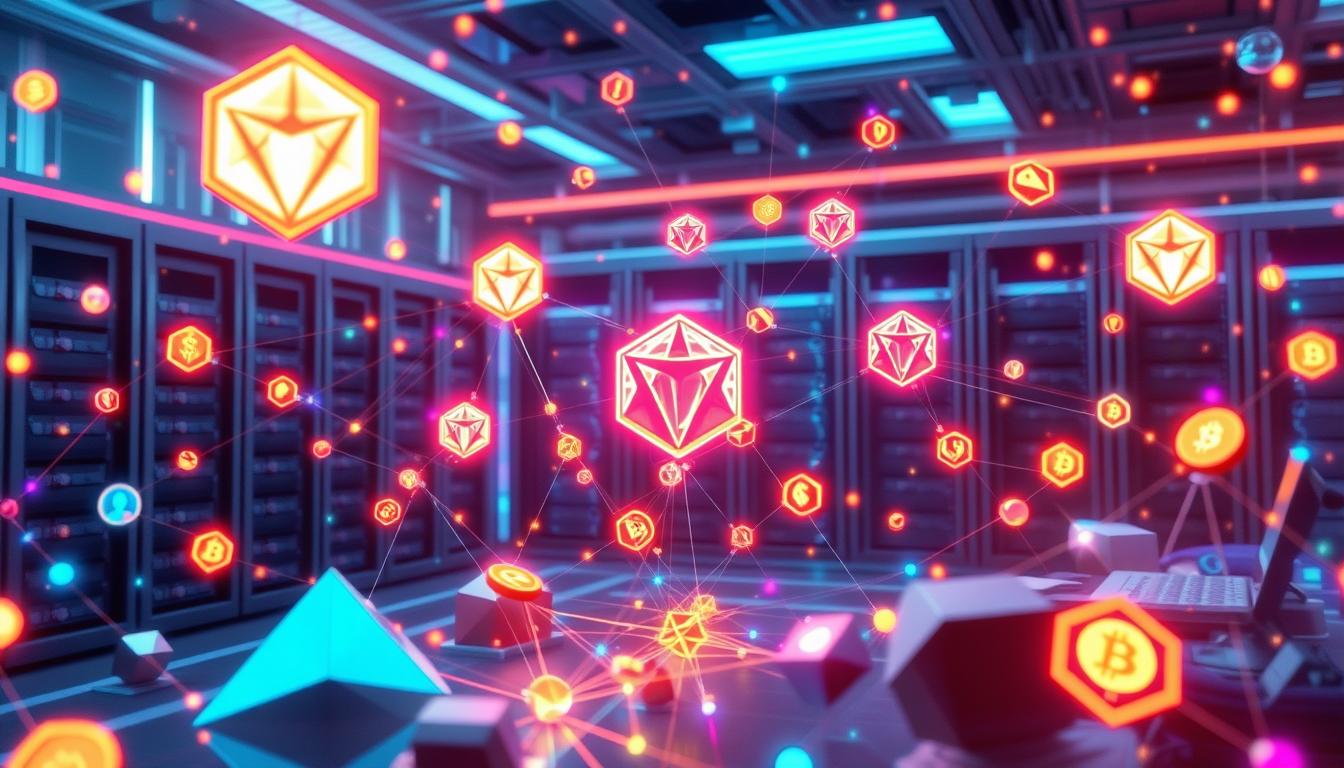Last year, the TON blockchain moved over $2 billion in value. This big number shows how key TON token collators are in the digital world. They help with transactions and keep the network strong. Knowing about TON token collators is key for anyone getting into the world of token governance.
Let’s look closer at what TON token collators do. They make sure the TON blockchain works smoothly. They keep the network fast and open for many apps and services. The support from collators makes the digital ecosystem safe and reliable for exchanging value.
Key Takeaways
- TON token collators are critical for maintaining the integrity of the TON blockchain.
- They facilitate high transaction volumes, contributing to a robust digital asset ecosystem.
- Understanding collators is important for navigating token governance effectively.
- Collators enhance decentralization, ensuring network reliability.
- Insights into TON token collators can empower users in leveraging blockchain technology.
What are TON Token Collators?
TON token collators are important parts of the TON (Telegram Open Network) system. They process and check transactions. As specialized nodes, they gather and approve block transactions. This makes sure the blockchain works well. They are like decentralized network validators. Their job keeps digital assets running smoothly.
Collators are key in maintaining the network’s health. They keep data moving without stopping. This is key to preventing slowdowns. In a decentralized network, not having just one failure point makes the network stronger against threats.
Finally, TON token collators keep the TON network running well. They are crucial for checking transactions and keeping data safe1. Their work ensures a trustworthy and speedy blockchain system.
The Role of Collators in the TON Blockchain
Collators play a key role in the TON blockchain, ensuring it runs smoothly and securely. They gather transactions and create new blocks. This helps keep the TON ecosystem efficient and improves the user experience by making services quick and reliable.
Collators do more than just collect transactions. They work with other nodes in the TON blockchain to keep things moving well. They check transactions and make sure the new blocks meet the network’s security and compatibility standards.
The recent interest in the network’s token supply highlights its capacity for handling lots of transactions. The TON blockchain is designed for growth and fast transaction speeds. This design allows collators to handle more data without losing security or slowing down. This is good news for everyone using the network2.
In short, collators are vital for the TON blockchain’s structure. They improve transaction processing, making the network more reliable and efficient.
Importance of TON Token Collators for Decentralization
TON token collators play a key role in making the TON network decentralized. They manage many collators. This makes the power within the network spread out fairly. It ensures that everyone gets a say in how things are run. This setup not only includes more people but also makes the network much safer. Many separate validators help keep the network strong against attacks. This keeps the blockchain safe and long-lasting.
The growth of the TON ecosystem means more collators are joining. With more collators, no single group can control all decisions. This allows for more people to have a say, which leads to better ideas and innovations. Also, having many validators means there’s less chance of the network failing due to one issue. This makes the network stronger and more reliable.
Overall, TON token collators are crucial for the network’s decentralization. Their work keeps the TON network growing and competitive in the blockchain world3.
How TON Token Collators Work
The role of TON token collators is vital for the network’s success. They help validate transactions and create new blocks. This is key for the ecosystem’s functioning.
Collators communicate with each other to keep the network running smoothly. This teamwork ensures the blockchain remains accurate and secure.
To be a collator, one must have the right tech and internet connection. They use special tools and rules for efficient transaction processing.
Collators have the job of making new blocks. They check if transactions are correct. This step keeps the blockchain safe and trustworthy.
Knowing how collators work helps us see their value in TON. They keep the network fast and healthy. Their efforts are crucial for its success41.
TON Token Collators vs. Blockchain Validators
It’s key to understand the difference between TON token collators and blockchain validators. This helps grasp the Ton blockchain’s structure. TON token collators handle block submissions and network integrity. Meanwhile, blockchain validators check transactions and ensure network consensus.
They have different tasks in the network. Ton token collators package and propose transactions. This keeps transactions flowing smoothly, speeding up confirmations. On the other hand, validators are part of the consensus process. They check transaction authenticity and look out for fraud.
Both roles are crucial for the network’s stability and safety. They work together. This synergy boosts the Ton blockchain, creating a trust-filled decentralized space. A balanced collaboration between validators and collators is essential for top performance.
Their interaction strengthens the ecosystem’s security and efficiency. Understanding these roles sheds light on their importance. It shows how they bolster the resilience of the TON blockchain. This makes it a more appealing choice for users.
| Aspect | TON Token Collators | Blockchain Validators |
|---|---|---|
| Primary Function | Submit and propose blocks | Verify transactions and maintain consensus |
| Transaction Speed | Facilitates faster confirmations | Ensures transaction authenticity |
| Network Role | Maintains transaction flow | Monitors for fraudulent activity |
| Collaboration | Works with validators for efficiency | Collaborates with collators to promote security |
In summary, TON token collators and blockchain validators have their special roles. But it’s their teamwork that builds a secure, fast blockchain network3.
Understanding the Functionality of Validator Node Providers
Validator node providers are key to keeping decentralized networks running well. They ensure the blockchain meets user needs without a hitch. By learning about the different types of validator node providers, we grasp their roles in the network.
Types of Validator Node Providers
There are various kinds of validator node providers, such as:
- Public Validators: They manage open nodes, allowing anyone to join and support network decentralization and accessibility.
- Private Validators: These providers work within closed networks, mainly for certain organizations or groups.
- Hybrid Validators: They blend public and private elements, serving diverse network needs effectively.
Key Responsibilities of Validator Node Providers
The main duties of validator node providers in a decentralized setup include:
- Maintaining Node Availability: It’s essential they keep nodes up and running constantly for network dependability.
- Ensuring Data Integrity: These providers check transactions, ensuring the blockchain stays unaltered.
- Processing Transaction Validations: They help conduct and confirm transactions within the system.
Validator node providers are vital for the security and smooth operation of a decentralized network. As blockchain technology evolves, they must keep up, using new methods to better their services. Understanding how blockchain works shows how crucial they are for maintaining efficient networks. For deeper insights into blockchain’s impact on various fields, check out this link5.
Benefits of Using TON Token Staking Services
Staking TON tokens offers a chance to earn rewards while making the network safer. This method helps you see a return on your investment. It also helps make the blockchain more solid and effective.
Return on Investment for Stakers
Earning good returns on investment draws people to TON token staking. By staking your tokens, you back up the network. At the same time, you gain extra profits from staking rewards. These benefits depend on the network’s success and the staking rules of the TON platform.
Security Enhancements from Staking
Staking is key in boosting the TON network’s security. Your staked tokens help stop harmful attacks on the system. This helps ensure validators work for the network’s good, raising its security. This approach benefits both you and creates a safer, more stable blockchain for everyone.
To learn more about investing in cryptocurrency, check out this resource36.
Consensus Algorithm Nodes in the TON Network
In the TON network, consensus algorithm nodes play a vital role. They keep the system strong and running smoothly. These nodes agree on transaction validity and the blockchain state.
They use complex consensus methods to validate transactions. This reduces fraud risk.
Overview of Consensus Mechanisms
The TON network uses different consensus mechanisms. These cater to various transaction settings. They help consensus nodes work right.
- Proof of Stake (PoS): Nodes validate transactions based on their token stakes, enhancing security and cutting energy use.
- Delegated Proof of Stake (DPoS): A chosen few, not every node, validate transactions, increasing efficiency and speed.
- Byzantine Fault Tolerance (BFT): Ensures agreement is reached, even with some faulty nodes, further securing the network.
Impact on Network Performance
Consensus algorithm nodes boost the TON blockchain’s performance. They help in speeding up transactions and increasing throughput. This makes users happier.
But, if the mechanisms aren’t right, they can slow down the network. Regular checks of these algorithms are vital for a top-notch network. They make the network safer, building trust in the TON environment step by step.
Understanding the Risks of Digital Asset Collators
Navigating the world of digital asset collators, it’s key to know the risks. Centralization threats are big challenges in the TON ecosystem. When collators concentrate, few may control everything, leading to serious network security risks. Such centralization risks the network’s integrity and makes it prone to attacks.
Collator failures are a major worry. If one fails, it could disrupt transactions and hurt the network’s trustworthiness. Downtime might also lose users’ trust. This harms the ecosystem’s stability and the worth of linked assets.
Vulnerabilities in technology and software are issues too. Weaknesses or old systems can let hackers in. It’s crucial to keep software and protocols up to date to reduce risks.
To fight these threats, we need proactive steps. We should diversify collators, improve auditing, and increase network security risks awareness. Working together and being watchful makes the ecosystem safer.
Conclusion
The work of TON token collators is crucial for keeping the TON blockchain fast and secure. They help check transactions are right and strengthen the network by spreading out control. This stops any one person from having too much power and builds trust among users. As we see changes in the blockchain world, learning about collators helps us understand the system better. It also opens our eyes to new chances for making money, like the high-reward staking offers from Pepe Unchained7.
There’s growing excitement around fresh projects and the rewards they offer for staking, especially with names like Flockerz making waves. Flockerz, for example, had a big start and promises stakers rewards as high as 7000% if they join early7. This shows a real effort to give back value to the community. It’s worth thinking about how these options might impact your investment plans in the world of TON blockchain.
Collaborating with TON token collators and keeping up with new tech could really pay off. Staying up to date lets you make smarter decisions in a world where technology and finance meet. The future looks bright, and understanding these aspects is key to grabbing the opportunities that come your way8.





















